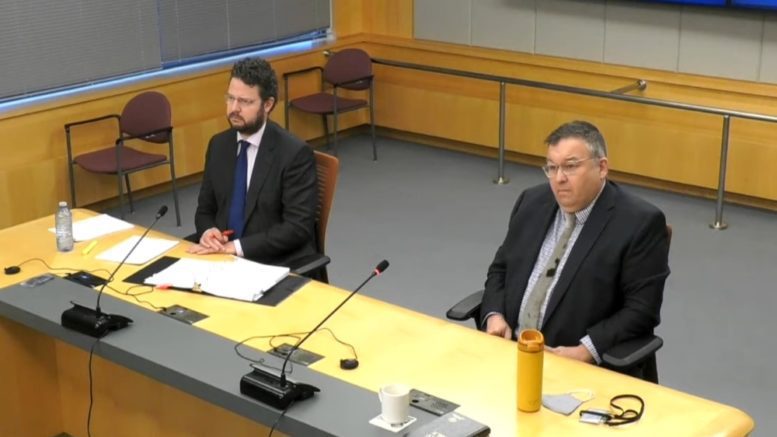After a delay of nearly three weeks, the inquiry into a conduct complaint against MLA Steve Norn resumed on Thursday.
The inquiry returned with the cross examination of Glen Rutland, the acting clerk at the time when Norn broke isolation to visit the Legislative Assembly in April.
Much of the exchange between Norn’s lawyer, Steven Cooper, and Rutland was to determine what kind of support and advice Rutland gave Norn after breaching isolation.
Rutland testified that he called Norn to tell him the Legislative Assembly had video footage of him entering the building on April 17, while he was still supposed to be isolating.
During that call, Rutland said Norn told him that he had a “political exemption” from isolating.
This took both Cooper and Maurice Laprairie, the adjudicator’s lawyer, by surprise as it was not something Rutland had previously brought up to either party.
Rutland said he did not question Norn’s claim of an exemption at the time, and instead focused on the safety of assembly employees, including the security guard that was in contact with Norn when he visited the Legislative Assembly.
During his testimony, Rutland said he helped craft Norn’s media statement issued on April 23, saying he had tested positive for COVID-19.
During that process, Rutland said Norn initially had a section saying he had “followed all the rules.” Rutland said he advised Norn to remove the claim as he had previously broken isolation. Rutland said Norn accepted and removed the claim, and ultimately approved the statement before it was sent to media.
However, on the same day Norn was quoted by Cabin Radio saying that he had followed all the rules.
Rutland said he was contacted by another MLA that saw the report that morning and knew Norn had broken isolation.
Rutland said he was “frustrated” and “exasperated” after receiving the information, but that he would contact Norn. During the follow-up call, Rutland said he and Norn discussed whether Norn wanted to issue a clarifying statement, but that he decided he would not offer any additional information to media.
Cooper asked Rutland several questions around why he didn’t advise Norn on “how best to repair the damage,” whether he gave Norn “all the advice that he needed to make a good decision,” and, if he “let him down by simply giving him information without recommending that (he) do one thing or another.”
Rutland replied, “I personally take great offense to any statement saying that we do not provide Mr. Norn with support, advice and information.” He added that he spoke with Norn on a daily basis following the statement of testing positive and that the clerk’s office continued to offer support until August.
Deputy chief public health officer testifies
Dr. Andy Delli Pizzi, the deputy chief public health officer, also testified on Thursday.
He was questioned by another of Norn’s lawyers, Ronald Halabi.
In several instances, Halabi gave hypothetical situations that resembled events Norn partook in while isolating.
One example was whether a person was a risk to a child if they hugged and kissed them on day five of their isolation period. (That’s essentially the case with Norn.)
Dr. Delli Pizzi said there was a chance the individual could transmit the virus to the child but that importation of the virus depended on several other factors, including the rate of infection at the location and public health measures in place, among others.
Asked about a situation where two individuals are in the Great Hall at the Legislative Assembly with masks on and maintaining social distance, Dr. Delli Pizzi considered the situation “low risk.”
He said it was the same for people meeting outside with masks on and maintaining distance as well.
Dr. Delli Pizzi also testified that someone is most likely to pass on the virus two to three days before they become symptomatic, and up to about 10 days after symptoms start. However, a person can also still test positive for COVID-19 weeks after recovering and that does not mean the virus can still be passed on at that time.
The hearing is scheduled to continue on Nov. 2.





